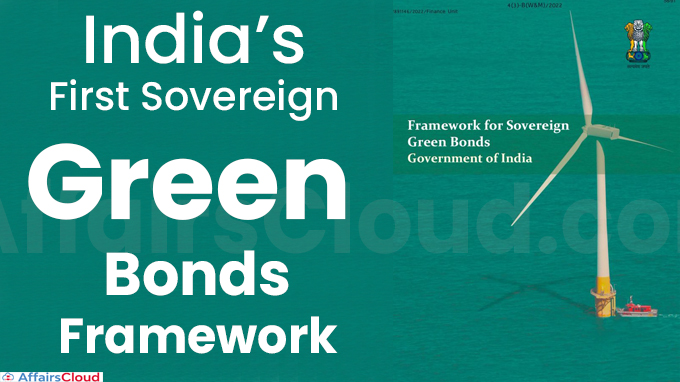 The Union Finance Minister of India, Nirmala Sitharaman approved the final and first Sovereign Green Bonds (SGrB) Framework of India.
The Union Finance Minister of India, Nirmala Sitharaman approved the final and first Sovereign Green Bonds (SGrB) Framework of India.
- This approval is on the lines of the Union Budget FY23 announcement, and as a part of Government of India’s (GoI) overall market borrowings in 2022-23 to issue SGrB for mobilising resources for green projects.
- It is also aligned with the India’s commitments under Panchamrit as elucidated by Indian Prime Minister (PM) Narendra Modi, at United Nations (UN) Climate Change Conference or COP26 at Glasgow, Scotland in November 2021.
Highlights:
i.SGrB will focus on funding solar power projects, followed by wind and small hydro projects.
- All fossil fuel-related projects, and biomass-based renewable energy projects that rely on feedstock from protected areas are not a part of the framework.
ii.GoI aims to issue 160 billion rupees ($1.93 billion) of such bonds between October and March 2023.
iii.There will not be any incentives or tax concessions on SGrB.
iv.The timing and size of these bonds will be decided by the Reserve Bank of India (RBI).
v.Notably, the framework has been rated ‘Medium Green’, with a “Good” governance score by a Norway-based independent second opinion provider CICERO, Center for International Climate Research.
- The Medium Green rating represents projects and solutions with significant steps towards the long-term vision, but is not quite there yet.
About Framework:
i.It is designed to comply with the following four components and key recommendations of the International Capital Market Association (ICMA) Green Bond Principles (2021).
- Use of proceeds
- Project evaluation and selection
- Management of proceeds
- Reporting
ii.GoI will use the proceeds raised from SGrB to finance and/or refinance eligible green projects in the public sector which help in reducing the carbon intensity of the economy.
iii.The proceeds will be deposited to the Consolidated Fund of India (CFI) as per the regular treasury policy, and then funds from the CFI will be made available for eligible green projects.
iv.To ensure the transparency of the proceeds’ allocation and accounting, a separate account will be created and maintained by the Ministry of Finance.
v.Public Debt Management Cell (PDMC) will keep a track of proceeds, and monitor the allocation of funds towards eligible green expenditures.
- Unallocated proceeds will be carried forward to successive years for investment.
vi.Department of Economic Affairs (DEA), Ministry of Finance reserves the right to modify this Framework as per the international best practices or GoI’s commitments and environmental priorities.
- Changes to the Framework will be reviewed by an independent provider.
vii.Ministry of Finance will set up a dedicated information system for maintaining a complete Green Register which include the details of the green bond issuance, proceeds generated, allocations made to eligible projects, among others.
Formation of Green Finance Working Committee:
As per the provision of the framework, the Ministry has formed a Green Finance Working Committee (GFWC) to validate key decisions on the issuance of SGrB. It will be chaired by the Chief Economic Adviser, Government of India (Currently- Dr Venkatramanan Anantha Nageswaran).
- It will include members from the implementing departments, Ministry of Environment, Forests and Climate Change (MoEFCC), NITI (National Institution for Transforming India) Aayog, Budget Division of DEA and Infrastructure Finance Secretariat, DEA.
Key Points:
i.GFWC will meet at least twice a year to support the Ministry of Finance with selection and evaluation of projects.
ii.The allocation of the proceeds will be reviewed in a time-bound manner by the GFWC to ensure that the allocation of proceeds is completed within 24 months from the date of issuance.
Benefit of Framework:
It will further strengthen India’s commitment towards its Nationally Determined Contribution (NDCs) targets adopted under the Paris Agreement, and help in attracting global and domestic investments in eligible green projects.
What is SGrB?
The government issues sovereign green bonds to allocate funds to projects associated with climate adaptation and climate mitigation. Those investors having an interest in environment and climate conservation projects can buy sovereign bonds.
- Green bonds command a relatively lower cost of capital as compared to regular bonds and necessitates credibility and commitments associated with the process of raising bonds
Click Here for Official Framework
Point to be noted:
i.India’s commitment to the preservation of the environment is enshrined in Article 48-A of the Indian Constitution.
ii.India’s commitments for climate action under Panchamrit (five nectar) include the following:
- Reach 500GW (Giga Watt) non-fossil energy capacity by 2030
- 50 per cent of its energy requirements from renewable energy by 2030
- Reduction of total projected carbon emissions by one billion tonnes from now to 2030
- Reduction of the carbon intensity of the economy by 45% by 2030, over 2005 levels
- Achieving the target of net zero emissions by 2070
Recent Related News:
i.The Ministry of Environment, Forest and Climate Change (MoEFCC), the United Nations Development Programme (UNDP) and the Energy and Resources Institute (TERI) jointly collaborated to launch the “Global Environment Facility Small Grants Programme (GEF-SGP)”.
ii.Hongkong and Shanghai Banking Corporation Limited (HSBC) has committed Rs 125 crore over the next five years to promote green initiatives in India as part of its efforts to mitigate the impacts of climate change.
About Ministry of Finance:
Union Minister– Nirmala Sitharaman (Constituency- RajyaSabha, Karnataka)
Ministers of State (MoS)– Pankaj Chaudhary (Constituency- Maharajganj, Uttar Pradesh); Dr. Bhagwat Kishanrao Karad




